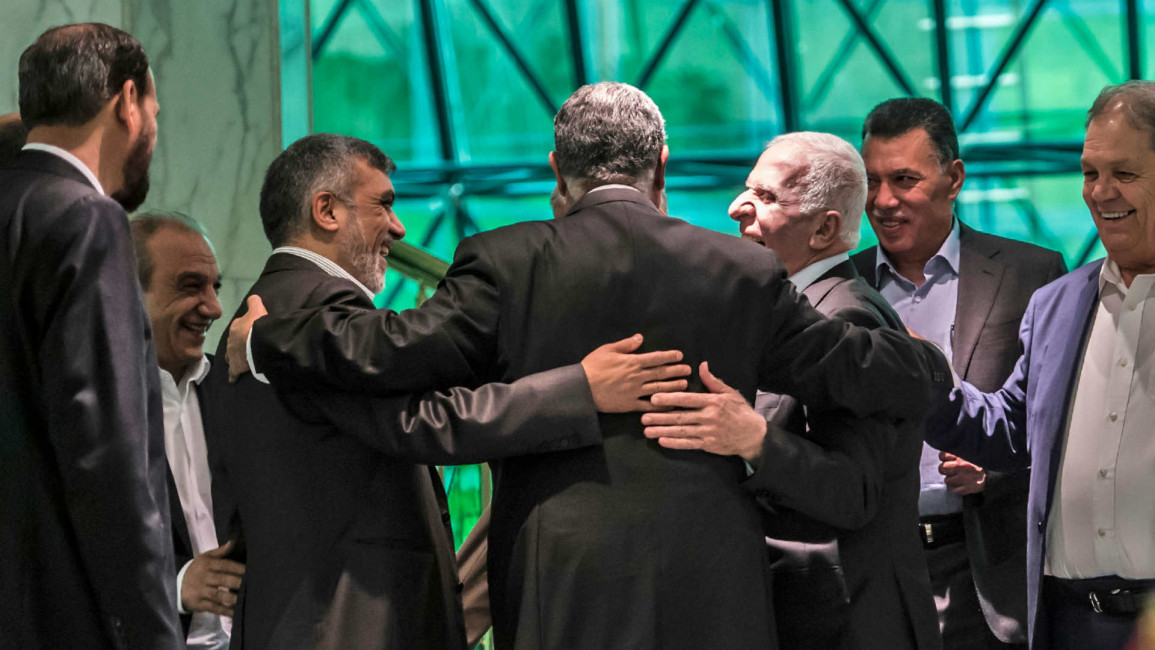
What must happen next for a Palestinian peace deal
For the reconciliation to take root, it is important that the lessons of the past are learned, and that serious efforts are in place to prevent a split from Ramallah from ever occurring again.
Palestinians have belatedly learned the obvious: No progress can ever happen in the peace talks or in strengthening Palestinian national identity while division and splits continue. It is clear that differences of opinion, strategies and tactics might pop up, but there is clearly much more uniting us than driving us apart.
Unity for Palestinians, both geographically and politically, is very important. Israel has worked extra hard to strategically divorce Gaza from the West Bank, in the hope that allowing a mini-state in Gaza will be grounds to say the Palestinians already have their state.
Politically, it has been next to impossible for a single Palestinian negotiating team to be effective, while the other side questions their mandate and legitimacy.
Although it has not yet been finalised, one of the key components of the current reconciliation is the need to reunify the PLO in a way that integrates all factions, including Hamas and Islamic Jihad.
 |
A unified session of the Palestine National Council must be held to codify this unity |  |
If and when this takes place, Palestinians will be able to agree to a single strategy and path of liberation that everyone can sign up to. The fact that Hamas has moderated its position to accept the concept of an independent state based on the '67 borders means that it should not be difficult to reach a political platform that the majority of Palestinians will agree on.
To help reach the Palestinian aspiration of freedom and independence, a unified session of the Palestine National Council must be held to codify this unity and produce an agreed strategy and leadership.
Twitter Post
|
While unity is important for so many reasons, the need to speak in one voice is more crucial now, with the White House set to lay down within the next few months its solution to the Palestinian-Israeli conflict.
While most Palestinians are not expecting that whatever comes out of Washington will meet the minimum Palestinian requirements, the need for unity is important nonetheless. Whether US President Trump's idea of the "ultimate deal" will be accepted or rejected, Palestinians can't afford to be divided at this crucial period.
Israelis who have not been happy with the reconciliation effort but are held back from torpedoing it by the US administration will not be able to continue rejecting the need to make peace. No longer will Israel be able to claim that the current Palestinian leadership represents all Palestinians (both geographically and politically).
Read more: Appeasing Zionists is the only lesson the University of Illinois will ever learn
Palestinian unity, of course, will not make achieving peace any easier.
It could be argued that a unified Palestinian delegation to any talks will have the mandate to tackle difficult issues and come up with reasonable plans that most Palestinians can live with. A divided and weak Palestinian team would be less able to take tough positions because of the inability to speak for all Palestinians and more importantly sell any agreed to solution to the public at large.
 |
National unity and reconciliation are the bedrock of any viable national liberation movement |  |
Negotiations, if and when they start, will not be easy. The fact that Israel's prime minister and the US president are refusing to even utter the term two-state solution doesn't bode well for the plans to establish a truly independent Palestinian state.
And even if the Palestinians might feel stronger in unity, the Israeli prime minister is facing serious corruption charges that are likely to weaken his ability to make the needed concessions for peace.
A more coherent liberation pathway based on nonviolent protest, as well as popular struggle, boycotts and international solidarity will need to be perfected if the Palestinian efforts for liberation are going to have any chance of fruition.
For the time being, the reconciliation effort must be allowed to continue and the lessons must focus on how to ensure the dark decade of splits and divisions are forever closed.
Daoud Kuttab is an award-winning Palestinian journalist and former Ferris Professor of Journalism at Princeton University.
Follow him on Twitter: @daoudkuttab
Opinions expressed in this article remain those of the author and do not necessarily represent those of The New Arab, its editorial board or staff.



